Related Research Articles
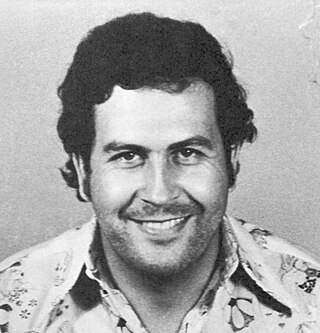
The Medellín Cartel was a powerful and highly organized Colombian drug cartel and terrorist organization originating in the city of Medellín, Colombia, that was founded and led by Pablo Escobar. It is often considered to be the first major "drug cartel" and was referred to as such; due to the organization's upper echelons and overall power-structure being built on a partnership between multiple Colombian traffickers operating alongside Escobar. Included were Jorge Luis Ochoa Vásquez, Fabio Ochoa Vásquez, Juan David Ochoa Vásquez, José Gonzalo Rodríguez Gacha and Carlos Lehder. Escobar's main partner in the organization however was his cousin Gustavo Gaviria who handled much of the cartel's shipping arrangements and the more general and detailed logistical aspects of the cocaine trafficking routes and international smuggling networks which were supplying at least 80% of the world's cocaine during its peak. Gustavo, also known as León seems to have also had a strong hand in the cartel's unprecedented acts of narcoterrorism, right alongside his cousin Pablo and was considered to be second in command of the cartel and therefore one of Colombia's most wanted men, with both him and Escobar having arrest warrants pending from other nations where their criminal activity had spread to, such as in Spain and the U.S. Meanwhile, Pablo Escobar's brother Roberto Escobar acted as the organization's accountant. The cartel operated from 1976 to 1993 in Colombia (Antioquia), Bolivia, Panama, Central America, Peru, the Bahamas, the United States, as well as in Canada.
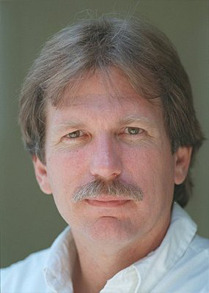
Gary Stephen Webb was an American investigative journalist.
The Supreme Team was an organized crime syndicate that operated throughout the 1980s in New York City. Their headquarters was in Baisley Park, in South Jamaica, Queens, New York City, New York. The leaders were Kenneth "Supreme" McGriff and his nephew, Gerald "Prince" Miller. In 1989, McGriff spent 10 years in a federal prison for a narcotics conviction.

Invasion U.S.A. is a 1985 American action film produced by Cannon Films, and starring Chuck Norris. It was directed by Joseph Zito. It involves the star fighting off a force of Soviet/Cuban-led guerrillas.
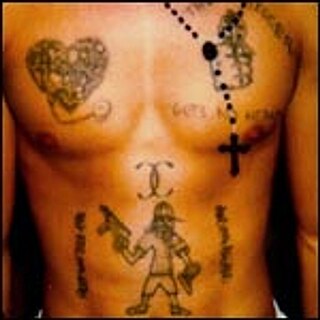
The Crips are an alliance of street gangs that is based in the coastal regions of Southern California. Founded in Los Angeles, California, in 1969, mainly by Raymond Washington and Stanley Williams, the Crips began as an alliance between two autonomous gangs, and developed into a loosely connected network of individual "sets", often engaged in open warfare with one another. Its members have traditionally worn blue clothing since around 1973.
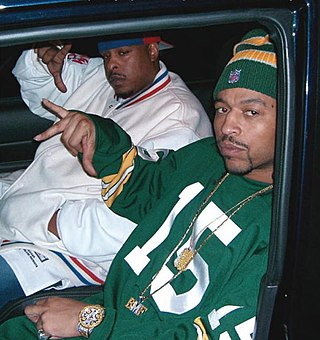
The Black Mafia Family (BMF) is a drug trafficking and money laundering organization in the United States. It was founded in 1985, in Southwest Detroit by brothers Demetrius Edward "Big Meech" Flenory and Terry Lee "Southwest Tee" Flenory. By 2000 it had established cocaine distribution sales throughout the United States through its Los Angeles-based drug source and direct links to Mexican drug cartels. The Black Mafia Family operated from two main hubs: one in Atlanta for distribution run by Demetrius Flenory and one in Los Angeles to handle incoming shipments from Mexico run by Terry Flenory.
A number of writers have alleged that the United States Central Intelligence Agency (CIA) was involved in the Nicaraguan Contras' cocaine trafficking operations during the 1980s Nicaraguan civil war. These claims have led to investigations by the United States government, including hearings and reports by the United States House of Representatives, Senate, Department of Justice, and the CIA's Office of the Inspector General which ultimately concluded the allegations were unsupported. The subject remains controversial.
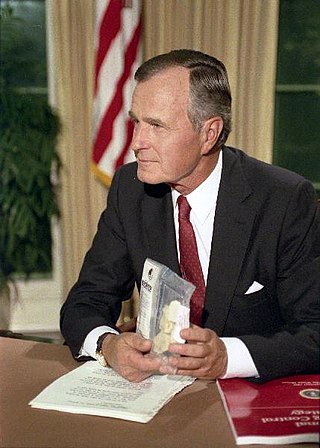
The crack epidemic was a surge of crack cocaine use in major cities across the United States throughout the entirety of the 1980s and the early 1990s. This resulted in a number of social consequences, such as increasing crime and violence in American inner city neighborhoods, a resulting backlash in the form of tough on crime policies, a massive spike in incarceration rates, and a sharp escalation of the war on drugs.
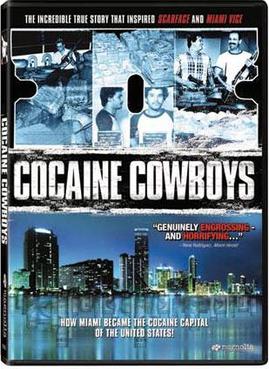
Cocaine Cowboys is a 2006 documentary film directed by Billy Corben, and produced by Alfred Spellman and Billy Corben through their Miami-based media studio Rakontur. The film explores the rise of cocaine dealer Jon Roberts, described by prosecutors as "The Medellin Cartel's American representative". The film chronicles his role in the Miami drug war. The producers of Cocaine Cowboys use interviews with law enforcement, journalists, lawyers, former drug smugglers, and gang members to provide a first-hand perspective of the Miami drug war.
In the late 19th and early 20th centuries, African American organized crime emerged following the first and second large-scale migration of African Americans from the Southern United States to major cities of the Northeast, Midwest, and later the West Coast. In many of these newly established communities and neighborhoods, criminal activities such as illegal gambling, speakeasies and were seen in the post-World War I and Prohibition eras. Although the majority of these businesses in African American neighborhoods were operated by African Americans, it is often unclear the extent to which these operations were run independently of the larger criminal organizations of the time.
The East Harlem Purple Gang was a gang or organized crime group consisting of Italian-American hit-men and heroin dealers who were semi-independent from the Italian-American Mafia and, according to federal prosecutors, dominated heroin distribution in East Harlem, Italian Harlem, and the Bronx during the 1970s and early 1980s in New York City. Though mostly independent of the Italian-American Mafia and not an official Mafia crew, the gang was originally affiliated with and worked with the Lucchese crime family and later with the Bonanno crime family and Genovese crime family. It developed its "closest ties" with the Genovese family, and its remnants or former members are now part of the Genovese family's 116th Street Crew.
Organised crime in Nigeria includes activities by fraudsters, bandits, drug traffickers and racketeers, which have spread across Western Africa. Nigerian criminal gangs rose to prominence in the 1980s, owing much to the globalisation of the world's economies and the high level of lawlessness and corruption in the country.
A drug lord, drug baron, kingpin, or lord of drugs is a type of crime boss, who is in charge of a drug-trafficking network, organization, or enterprise.
The Illegal drug trade in Puerto Rico is a problem from a criminal, social, and medical perspective. Located in the Caribbean, Puerto Rico has become a major transshipment point for drugs into the United States. Violent and property crimes have increased due in part to dealers trying to keep their drug business afloat, using guns and violence to protect themselves, their turfs, and drug habits.
The US state of Georgia has seen a rise in the number of gangs over recent years, in the main focused on the illegal drug trade.
Link Valley is a community in southwestern Houston, Texas that consists of many apartment complexes. In the late 1980s it was nicknamed "Death Valley" due to high levels of drug-related and violent crime. Since a 1989 raid Link Valley has not had significant criminal activity.
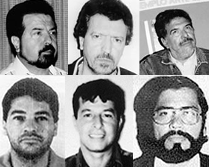
Drug barons of Colombia refer to some of the most notable drug lords which operate in illegal drug trafficking in Colombia. Several of them, notably Pablo Escobar, were long considered among the world's most dangerous and most wanted men by U.S. intelligence. "Ruthless and immensely powerful", several political leaders, such as President Virgilio Barco Vargas, became convinced that the drug lords were becoming so powerful that they could oust the formal government and run the country.
The Miami drug war was a series of armed conflicts in the 1970s and 1980s, centered in the city of Miami, Florida, between the United States government and multiple drug cartels, primarily the Medellín Cartel. It was predominantly fueled by the illegal trafficking of cocaine.

The 1986 Florida Attorney General election was held on November 4, 1986. Bob Butterworth would be elected defeating Jim Watt with 58.63% of the vote. Incumbent James C. Smith would not run in this election.

The cocaine boom was a stark increase in the illegal production and trade of the drug cocaine that first began in the mid to late 1970s before then peaking during the 1980s. The boom was the result of organized smugglers who imported cocaine from Latin America to the United States, and a rising demand in cocaine due to cultural trends in the United States. Smuggling rings of Cuban exiles organized trade networks from Latin America to Miami that streamlined the import of cocaine to the United States. Americans also began favoring less of the drugs popular in the 60s counterculture such as marijuana and LSD, and instead began to prefer cocaine due to a mystique of prestige that was developing around it. This increase in cocaine trade fueled the rise of the crack epidemic and government sponsored anti-drug campaigns.
References
- ↑ Miami Boys Export Terror Drugs, Death Come With Territory For Gang In Atlanta - Orlando Sentinel
- 1 2 articles.sun-sentinel.com/1988-08-22/news/8802180409_1_miami-boys-crack-cocaine-cocaine-network/2
- ↑ Miami Boys Export Terror Drugs, Death Come With Territory For Gang In Atlanta - Orlando Sentinel. May 9, 1989
- ↑ Gang mentality | Cover Story | Creative Loafing Atlanta